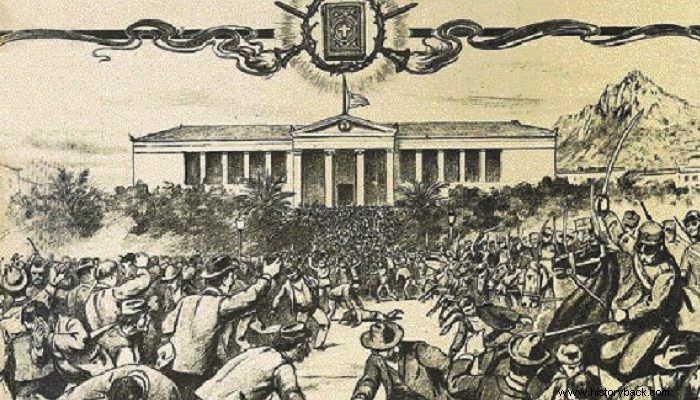
In 1901 the tensions in Greek society were not small. 4 years ago the great idea, the longing for the liberation of the lost homelands, had been affected by the total defeat of 1897. Similar longings for the Macedonian land were not only held by the Greeks, but also by the Bulgarians and the Slavs, since it seemed that will be lost from the control of the faltering Ottoman Empire. So the national dream was waking up again, but with new competitors against it.
At the height of the tension was the language issue. An issue alive for almost 2000 years, which did not simply want language to be a means of communication, but elevated it to a sacred position. Language not only connected the modern nation, but also confirmed national continuity from glorious antiquity until then.
On September 9, 1901, the newspaper "Acropoli" announced that it would continue to publish the Gospel according to Matthew, translated into the vernacular by A. Pallis. This was not the first time that a sacred text was translated into the vernacular. The theology professor F. Papadopoulos had previously attempted this by publishing a related book in limited editions. But now this translation did not go unnoticed and gathered the criticism of the other newspapers.
Initially the reactions are anemic. On September 18, the newspaper "Embros" writes:"...And this in the name of freedom of conscience. Crimes may be committed in the name of freedom, but under the condition that they are not directed against individuals, but against the entire society, the entire nation, against the country, against the religion, against the language. That is why we see dispassionately the annointing that has been taking place for some time in the columns of an Athenian newspaper against religion and against elegance, for the publication of a vanaussus, a self-made barbaric translation of the Gospel".
Few and small comments or cartoons are published against the Acropolis and A. Pallis. They claim that this effort mocks, desecrates and distorts the meaning of the Gospel. But current events are occupied by other issues. On the 22nd of September the publication is interrupted, but on the 30th of the same month it continues. The newspaper justifies the interruption by writing that it happened due to the temporary interruption of communication between Greece and Europe. It is noted that A. Pallis lived abroad.
On October 1, the Ecumenical Patriarch sends a letter to the Holy Synod of Greece asking to take measures to stop the publication of the translation. The publication continues as normal, but from mid-October the controversy grows. Pallis responds to those who criticize his translation, and "Acropolis" to the negative publications of other newspapers. Pallis is said to have declared after the unfortunate war of 1897 that he did not want to be called Greek and that he changed his nationality. These come to the fore and are used as tools to question his patriotism. Read the interesting sequel at the source
